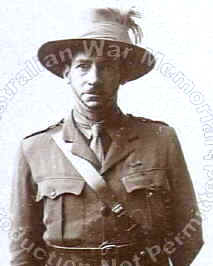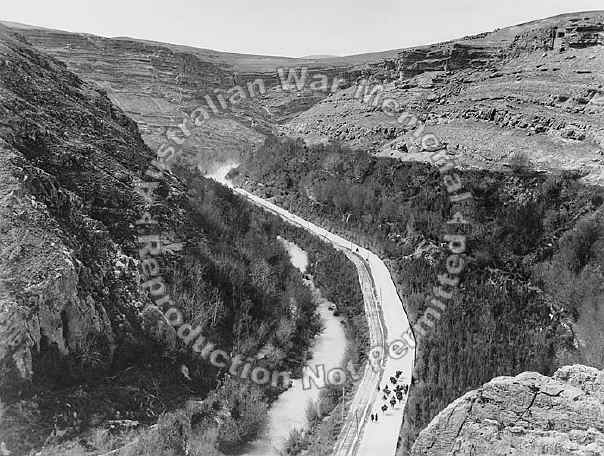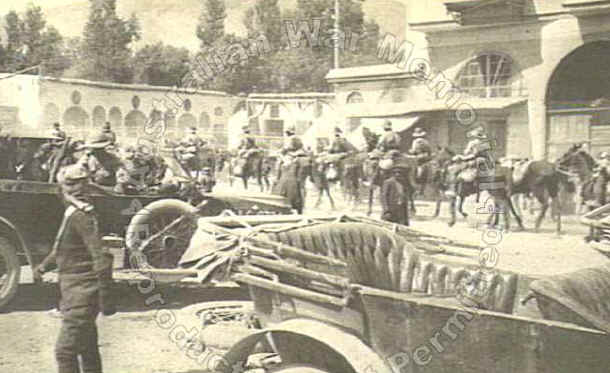 |
Lieutenant
Colonel (Lt Col) M W J Bourchier (later
Brigadier Honourable M W J Bourchier CMG DSO VD) who
commanded the 4th (Victorian) Light Horse Regiment.
He led his
regiment in the charge at Beersheba and later in operations in the
Es Salt region. During 1918 Lt Col Bourchier led the 4th Light
Horse Brigade in operations leading to the capture of Damascus.
This brigade consisted of the 4th and 12th Light Horse Regiments
and became known as 'Bourchier's Force'.
|
At
dawn on 19 September 19 18 General Allenby launched the offensive which
finally destroyed the Turkish armies in Palestine. When the British
infantry had driven a gap through the trenches on the plain ten miles
north of Jaffa, the Desert Mounted Corps under Lieutenant General Sir
Harry Chauvel passed through. Moving rapidly the mounted troops had
advanced nearly a hundred and fifty miles by the end of September and were
closing in on Damascus.
The
Australian commander planned to capture this historic city by cutting, with
the Australian Mounted Division, the Turks' road of escape by the northern
route and then pressing into the city from the south with the 4th and 5th Cavalry Divisions.
The
main line of retreat of the Turks was along the road and railway running
from Damascus through the eastern Lebations into the plain of Baalbek and
on across the western Lebanons to the seacoast at Beirut. A short distance
from the city the railway and road pass through the Barada Gorge.

Here
is the story as told in the words of the official historian:
"When
the Australian Light Horse reached the gorge and looked down on the narrow
floor, they saw it crowded with a great column of fugitive troops,
transport, and railway trains moving towards them from Damascus. The
situation was exceptional. The gorge, as it winds between the sheer desert
cliffs of the eastern buttress of the Lebations, is not more than a
hundred yards in width. Along this confined passage, crossing and
recrossing from side to side, tumbles the roaring Barada, and crowded
along its banks run the road and railway. As the Light-horsemen, with
their six machine guns, Hotchkiss guns, and rifles, took up positions on
the heights, they saw some hundreds of feet below them the massed and
confused enemy troops making their escape, as they believed, to the
Baalbek plain.
At
the same time, squadrons of Onslow's brigade, moving fast, had taken up a
fresh position farther west about Dumar, where under similar conditions
they caught another column of fugitives. German machine-gunners, operating
from the tops of motor lorries and trains, defied the challenge to
surrender, and all along the gorge the unequal issue was joined. The
result was sheer slaughter. The light horsemen, firing with fearful
accuracy, shot the column to a standstill and then to silence. For miles
the bed of the gorge was a shambles of Turks and Germans, camels and
horses and mules. Never in the campaign had the machine-gunners found such
a target.
All
night the Australians remained on their heights, firing occasional bursts
from the machine guns to ensure the blocking of the road. But the
precaution was unnecessary; no enemy troops entered the pass after the
fall of darkness."
Early
next morning, 1 October 1918, the Australians rode through Damascus....

"The
Australians on this wonderful morning were the only calm, purposeful men
in the clamorous city. Years of campaigning had moulded them into reserved
men of the world, and the streets of old Damascus were but a stage in the
long path of war. They rode with drawn swords, dusty and unshaven, their
big hats battered and drooping, through the excited people of the ancient
city, with the same easy casual bearing, and the same quiet
self‑confidence, which mark their bearing on their country tracks at
home. They ate their grapes, and smoked their cigars, and missed no dark
smiling eyes at the windows; but they showed no excitement or elation. And
their lean, long-tailed horses, at home now like their riders on any road
in the world, found nothing in the shouting mob or banging rifles of the
Arabs, or in the narrow ways and vivid hues of the bazaars, to cause them
once to shy or even cock an car."
Soon
after 7 o'clock they were clear of the city and in vigorous pursuit of the
enemy columns in flight towards Homs.
A
TROOPER
(First
A.I.F.)
from
AS YOU WERE ! by the AWM 1946 |